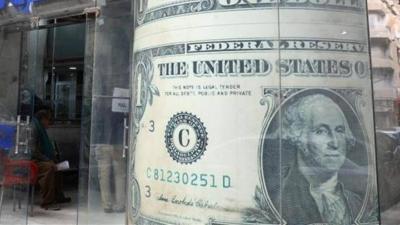The exchange rate of the US dollar has recently surpassed 41,000, seemingly heading towards 50,000, following a continuous increase since the fall of 2019, without any deterrent in the form of reforms or a return to proper functioning of banking and financial sectors. The further decline of the Lebanese pound occurs amidst a presidential vacuum and institutional paralysis, as the eighth session to elect a president took place today, a month after the doors of the presidential palace were closed, reflecting a blatant disregard for the nation's affairs.
Regarding the ongoing decline of the pound, economist Nseeb Gabrial stated via "Akhbar Al-Yawm" agency that the rise in the dollar's exchange rate is a result of lost confidence, especially since the relevant parties have given the impression that there is no seriousness in implementing the structural reforms necessary to start restoring trust and encouraging the flow of capital into Lebanon, which would provide liquidity in the markets.
He noted that the parallel market for the dollar's exchange rate emerged in September 2019 due to a shortage of foreign currency liquidity in the Lebanese economy, asserting that there are no regulations governing this opaque and unregulated market that remains subject to speculation, benefiting from political cover. He also mentioned that demand for foreign currencies from outside the borders affects the dollar's exchange rate. He concluded that as long as there is insufficient liquidity in the economy and confidence is lacking, speculation on the exchange rate will persist.
On the impact of starting to apply a customs dollar rate of 15,000 today, he said it is more accurate to refer to it as an increase in customs fees, the purpose of which is to cover increases in salaries, wages, and allocations for government employees. He mentioned that there are several measures the state can take to enhance trust and demonstrate seriousness in addressing revenue generation, including combating tax evasion and activating revenue collection in accordance with customs evasion, and fighting smuggling across borders in both directions.
Gabrial pointed out that the decline in revenues is not only due to the economic crisis but also due to strikes by public sector workers, which harms employees above all else, as delays in processing lead to delays in revenue collection for the treasury.
He stressed the need to support the purchasing power of workers and employees in the public sector, calling on the state to seek revenues to cover salaries and wages not solely from customs duties, but through reforms in the public sector, starting with the elimination of thousands of phantom jobs, which would show seriousness in addressing the issue and an intention for reform. He noted that there are dozens of agencies and funds whose existence is no longer justified, and parliamentary committees had proposed merging or abolishing them over five years ago without any decisions being made in this regard. Therefore, these measures should be taken alongside the implementation of the customs dollar, otherwise, what is happening amounts to an easy approach to the matter.
In response to a question, Gabrial supported adjusting the customs fees, stating that it is unacceptable for companies to pay taxes at an exchange rate of 1,500 L.L. while selling goods at prices higher than the dollar exchange rate in the parallel market. However, he emphasized that other sources of revenue for the treasury must also be sought.




